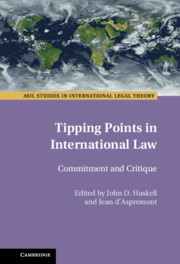Book contents
- Tipping Points in International Law
- ASIL Studies in International Legal Theory
- Tipping Points in International Law
- Copyright page
- Contents
- Contributors
- Acknowledgments
- 1 Experiencing Tipping Points in International Law
- 2 The Literary Performances of the Tipping Point
- 3 Authoritarianism
- 4 China
- 5 Democracy
- 6 Development
- 7 Digital
- 8 Environment
- 9 Health
- 10 Human Rights
- 11 Labor
- 12 Liberation
- 13 Multilateralism
- 14 Race
- 15 Religion
- 16 Rule of Law
- 17 Russia
- 18 Systems
- 19 Territory
- 20 United Nations
- 21 Universalism
- Index
7 - Digital
Published online by Cambridge University Press: 23 October 2021
- Tipping Points in International Law
- ASIL Studies in International Legal Theory
- Tipping Points in International Law
- Copyright page
- Contents
- Contributors
- Acknowledgments
- 1 Experiencing Tipping Points in International Law
- 2 The Literary Performances of the Tipping Point
- 3 Authoritarianism
- 4 China
- 5 Democracy
- 6 Development
- 7 Digital
- 8 Environment
- 9 Health
- 10 Human Rights
- 11 Labor
- 12 Liberation
- 13 Multilateralism
- 14 Race
- 15 Religion
- 16 Rule of Law
- 17 Russia
- 18 Systems
- 19 Territory
- 20 United Nations
- 21 Universalism
- Index
Summary
Contemporary international law is driven by advances in financial and information technology. These twin systems together function as a common linguistic and physical infrastructural layer for the entire planet, transcending national boundaries and cultural divisions. Financial and informational considerations dictate the budgetary and administrative practices of international legal institutions and practitioners, as well as the domestic legal systems upon which they rely. More broadly, the capacities and constraints of “Big Finance” and “Big Tech” shape the contours of legal and policy debates in fields ranging from war and global health, to ecological sustainability and intellectual property. While these debates and the underlying material forces that condition them have always been in flux, there is good reason to believe that we are approaching – or indeed, are in the middle of – an epochal inflection point on the scale of the transition from oral to literate society, or the invention of the printing press.
- Type
- Chapter
- Information
- Tipping Points in International LawCommitment and Critique, pp. 116 - 131Publisher: Cambridge University PressPrint publication year: 2021



